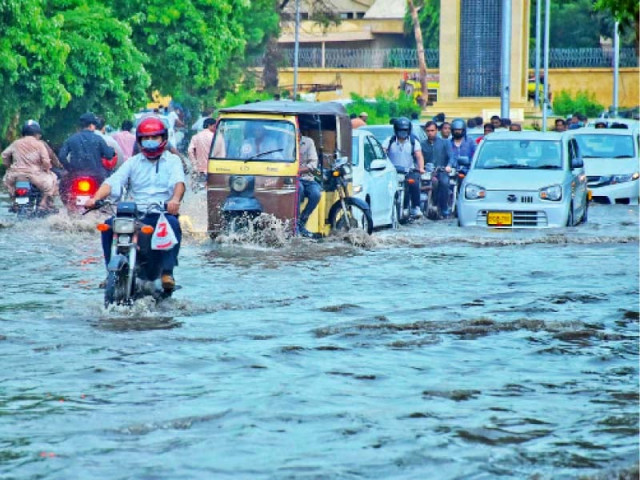Floods expose blockages in city drains - and politics
Disputes between tiers of govt hamstring the provision of services in Karachi

Mohammad Zakir, 35, who lives in a low-lying area of Karachi's Orangi Town, does not recall the authorities ever cleaning out the stormwater drain in his neighbourhood.
Thorani Goth was flooded during the monsoon rain from August 6 to August 8. During that - and a previous downpour in July - water came up to four feet inside Zakir's home, ruining furniture, electrical equipment and documents.
It also soaked an order of 250 women's garments he was due to decorate with sequins and beads - his first job in five months due to the pandemic.
"I'll put them out to dry to see if there are water stains on them," said the informal-sector craftsman. If the clothes were ruined, he would have to bear half the cost of Rs250,000, he added.
Karachi Mayor Wasim Akhtar said people "are certainly not exaggerating when they say water comes up chest-high into their homes."
The city has a network of 550 stormwater drains which flow into the Arabian Sea, but many are obstructed by illegal construction and sludge.
Akhtar said the city authorities cleaned the drains every year before the monsoon, except last year when the provincial government did not provide the necessary funds.
In the mayor's four-year term, management of Karachi's services has been hamstrung by disputes between different levels of government. Meanwhile, the city's infrastructure is struggling to cope with heavy rains.
Pakistan Meteorological Department's Sardar Sarfaraz said rainfall as little as 50mm could cause urban flooding in Karachi's low-lying areas, with the most recent downpour easily exceeding that.
After the havoc this July - with main roads submerged, sewage spewing from manholes and into homes, and power cuts lasting for hours - Prime Minister Imran Khan tasked the National Disaster Management Authority (NDMA) with sorting out the city's drains. The NDMA, helped by the military, said it had cleaned three major drains, removing more than 31,000 tonnes of sludge.
Touring the city, Sindh Information Minister Syed Nasir Hussain Shah said there were no floods in the city.
But Zakir's experience does not back up that assertion.
Illegal construction
Zakir blamed illegal construction along the drainage channels for the flooding, adding "the government needs to come here and bulldoze" it.
"The stormwater drains, some as wide as 200 feet, have over the years narrowed to just 30 feet due to unauthorised construction - so what do you expect?" asked the mayor.
The main responsibility lies both with residents who have encroached on land along the drain, and the provincial government for letting it happen, said Akhtar, adding that Sindh had taken control from the city authority but had not provided the budget owed.
A Sindh government spokesman said it had transferred Rs50 billion to the Karachi Metropolitan Corporation in the last three and a half years.
Solid waste dumped into stormwater drains exacerbates flooding in the city, which generates 13,000 tonnes of garbage daily. The Sindh Solid Waste Management Board collects 70 per cent of it, but told Reuters it did not know what happens to the rest.
Sewage is also being dumped in storm drains, officials said.
Longer-term plans?
Zubair Channa, director of the Sindh government-led Solid Waste Emergency and Efficiency Project (SWEEP), funded with $100 million from the World Bank, said encroachment on most of Karachi's large drains, coupled with their uneven width, caused disturbances in the water flow.
Drains feeding into the big water channels are also not maintained, making the flooding worse, he noted. "What is needed is a comprehensive engineering solution," he said, rather than "firefighting."
With floods causing so much devastation each year, Akhtar said it was time "to take the firm but unpleasant decision" of pulling down illegal buildings. But before that is done, people must be provided with an alternative, he added.
"There is enough government land that can be used for both vertical expansion and developing satellite towns around Karachi, where these people can be shifted," he said.
But with Karachi run by three tiers of government dominated by three different political parties, solutions to its problems are often lost in a war of words.
"We need the judiciary and the army to sit with experts like architects and town planners to resolve the issue," Akhtar said.
Published in The Express Tribune, August 13th, 2020.


















COMMENTS
Comments are moderated and generally will be posted if they are on-topic and not abusive.
For more information, please see our Comments FAQ